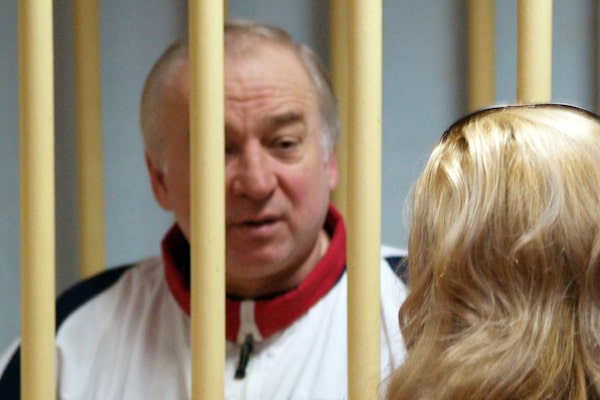
In this Aug. 9, 2006, file photo, former Russian military intelligence agent Sergei Skripal attends a hearing at a Moscow court.YURI SENATOROV/Getty Images
The poisoning of a former Russian double agent in Britain has taken a new twist with the UN’s chemical weapons watchdog backing the U.K.’s findings in a case that has prompted a global diplomatic row.
In a summary report released on Thursday, the Organization for the Prohibition of Chemical Weapons (OPCW) concluded that former spy Sergei Skripal, his daughter, Yulia, and a police detective were exposed to the “toxic chemical” identified by British scientists. “The results of analysis by the OPCW designated laboratories of environmental and biomedical samples collected by the OPCW team confirm the findings of the United Kingdom relating to the identity of the toxic chemical that was used in Salisbury and severely injured three people,” the report said. “The [team of inspectors] notes that the toxic chemical was of high purity. The latter is concluded from the almost complete absence of impurities.”
British officials have blamed Russia for the poisoning, alleging the Skripals and Detective Sergeant Nicholas Bailey were exposed to a type of nerve agent known as Novichok, which was developed in the Soviet Union in the 1980s. Russia has denied any involvement and insisted that it did not develop Novichok.
Ms. Skripal, 33, and Det. Sgt. Bailey, 38, have been released from hospital but Mr. Skripal remains in serious condition. Mr. Skripal, 66, has been living in Britain since 2010 and British officials say he was a likely target for Russia. During the 1990s, he worked for Britain’s MI6 spy service while serving as a Russian military intelligence officer in Moscow. He was arrested in 2004 and sentenced to 13 years in prison for treason, but won release in 2010 and came to Britain as part of a spy swap between Russia, Britain and the United States. He’d been living a quiet life in Salisbury, visited frequently by Ms. Skripal, who lives in Moscow.
The two were on an outing in the city last month when they were suddenly taken ill. Det. Sgt. Bailey was exposed after trying to help them get to the hospital. In the wake of the poisoning, Britain and two dozen allies expelled more than 100 Russian diplomats, with Russia responding in kind. Britain, the United States and France are also now weighing a possible military strike in Syria in response to allegations the Syrian government used chemical weapons recently with Russia’s backing.
While the OPCW backed up Britain’s findings in the Skripal case, the summary did not name Novichok and did not specify where the nerve agent came from. It did add that “the name and structure of the identified toxic chemical are contained in the full classified report of the secretariat, available to States Parties.”
British Foreign Secretary Boris Johnson seized on the findings as a vindication of Britain’s position. “There can be no doubt what was used and there remains no alternative explanation about who was responsible – only Russia has the means, motive and record,” Mr. Johnson said in a statement. “We will now work tirelessly with our partners to help stamp out the grotesque use of weapons of this kind and we have called a session of the OPCW Executive Council next Wednesday to discuss next steps. The Kremlin must give answers.”
The report came a day after Ms. Skripal issued a statement saying she had declined assistance from the Russian embassy in London and admonishing her cousin in Moscow from speaking out. “I find myself in a totally different life than the ordinary one I left just over a month ago, and I am seeking to come to terms with my prospects, whilst also recovering from this attack on me,” she said in the statement.
In reference to her cousin, Viktoria Skripal, who has questioned the British investigation, Ms. Skripal said: “I want to stress that no one speaks for me, or for my father, but ourselves. I thank my cousin Viktoria for her concern for us, but ask that she does not visit me or try to contact me for the time being. Her opinions and assertions are not mine and they are not my father’s.” Viktoria had applied for a visa to come to Britain but her application has been denied.
The Russian embassy in London has questioned Ms. Skripal’s statement. “We would like to make sure that the statement really belongs to Yulia. So far, we doubt it much,” the embassy said in a statement. “The text has been composed in a special way so as to support official statements made by British authorities and at the same time to exclude every possibility of Yulia’s contacts with the outer world – consuls, journalists and even relatives. … To sum up, the document only strengthens suspicions that we are dealing with a forcible isolation of the Russian citizen. If British authorities are interested in assuring the public that this is not the case, they must urgently provide tangible evidence that Yulia is all right and not deprived of her freedom.”
 Paul Waldie
Paul Waldie